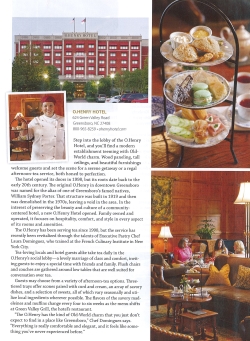Green Valley Grill, eight other Triad restaurants honored by Wine Spectator
By: Daniel Finnegan, Triad Business Journal
September 28, 2020
By: Daniel Finnegan, Triad Business Journal
September 28, 2020
Nine Triad restaurants are among the best in the world when it comes to wine, according to Wine Spectator.
The publication named 21 area restaurants to its 2020 Restaurant Awards list, which recognizes eateries with extraordinary wine lists. This year’s awards program recognized 3,776 dining destinations from all 50 states and more than 79 countries internationally. Winners were named in three categories, broken down by the variety of vintages or wine regions.
Green Valley Grill in Greensboro earned the highest grade — the Best of Award of Excellence — of the area restaurants honored by the magazine. The Best of Award of Excellence award is given to restaurants with 350 or more selections that represent a variety of vintages or wine regions. Wine Spectator cited Green Valley Grill for its selection of wines from France, Italy and California.
Eight Triad restaurants received the Award of Excellence, which recognizes establishments with at least 90 wine selections. Among them was Print Works Bistro in Greensboro, which like Green Valley Grill is owned by the Quaintance-Weaver Group.
The other Triad winners were:
The only North Carolina to earn the magazine’s top ranking — the Grand Award Winner — was the Angus Barn in Raleigh. Twenty-two N.C. restaurants received the Best of Award of Excellence.
By Chris Burritt, Business North Carolina
Photos by Stacey Van Berkel
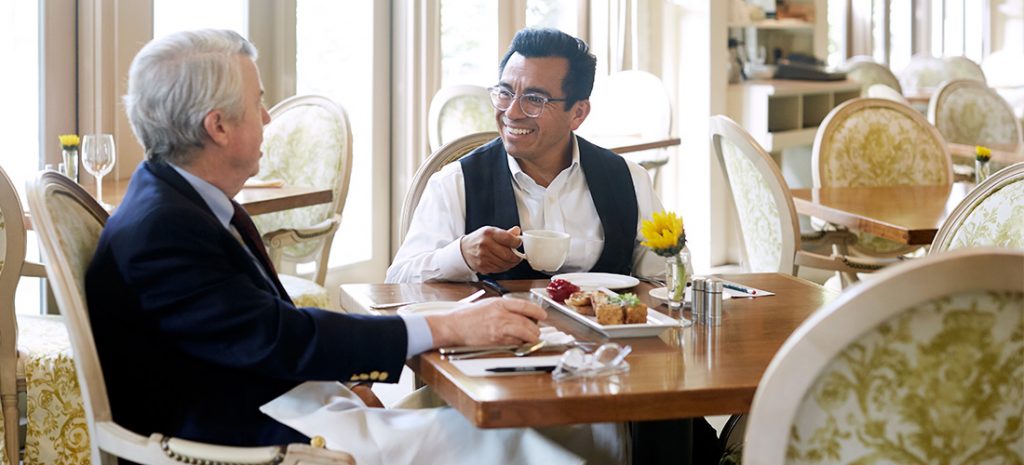
Edgar Lujan, right, has worked for three Quaintance-Weaver properties since 1998. He now is a server at Print Works Bistro
Back in 1978, Sister Sledge’s “We Are Family’’ reverberated through Dennis Quaintance’s first restaurant in Greensboro. Franklin’s Off Friendly had just opened, and the disco music was intended to pump up the waitstaff.
A year ago, Quaintance dusted off the ’70s hit for an even bigger employee gathering. He and his partners had decided to sell their company, Quaintance-Weaver Restaurants & Hotels, operator of some of Greensboro’s best-known upscale establishments. The O.Henry Hotel is attached to the Green Valley Grill, while Print Works Bistro adjoins another boutique hotel, the Proximity. Lucky 32 Southern Kitchen operates two restaurants, one in Greensboro and the other in Cary, after closing eateries in Winston-Salem and Raleigh about nine years ago.
Quaintance, 60, was planning for the future — and not just his own. Rebuffing queries from larger hospitality companies wanting to buy the businesses — if they had followed that course, the partners could have pocketed a higher valuation, he says — Quaintance and his partners had something different in mind.
One morning last November, after the Sister Sledge tune had revved up the standing-room-only crowd of employees, Quaintance said they were now the owners of the company he and his wife, Nancy, had started 28 years earlier with Greensboro real-estate developer and business investor Mike Weaver. The three had sold the business to an employee stock ownership plan, with the trust borrowing 100% of the transaction’s value. The owners collected no money at closing, while no bank financing was involved.
Authorized by Congress in 1974, ESOPs enable employees to own the companies where they work. The upside for workers is that company profits are plowed into employee retirement plans, while avoiding conventional corporate income tax.
“Every time we do something to make the company worth $1 more, we all share in it,’’ says Quaintance, who heads operations, while Nancy is part of the marketing, sales, operations and culinary teams. “Every time the value of the company goes down, we all share in that. Our interests are 100% aligned.’’
ESOPs remain rarities in a business world dominated by closely held, family-owned companies. Only one of the 100 largest ESOPs in the U.S. is based in North Carolina: hardwood-veneer and plywood maker Columbia Forest Products Inc., of Greensboro, according to the nonprofit National Center for Employee Ownership. Many public companies encourage workers to hold shares. But the center defines ESOPs as businesses in which at least half of all employees are eligible to participate in plans — and those employees collectively hold at least 50% ownership.
To take part, workers must be 18 years or older, have worked for the company for more than a year and gotten paid for at least 1,000 hours yearly. Vesting occurs after three years. (Weaver can’t participate in the ESOP because he’s not an employee.) How quickly retirement benefits accumulate for Quaintance-Weaver’s 620 employees — from managers to porters, cooks to housekeepers — depends upon the company’s profitability. The more money generated by operations, the quicker the debt shrinks, leaving more money for employees’ golden years.
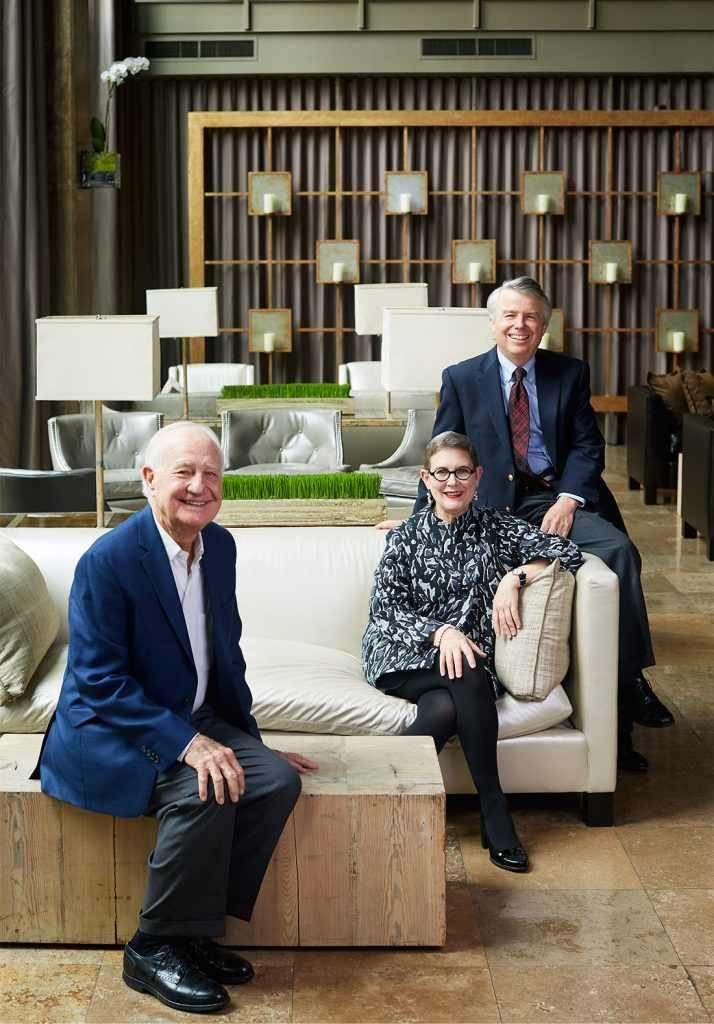
Among the first people Dennis Quaintance, right, met after moving to Greensboro in 1978 were Mike Weaver, a civic-minded real-estate developer and investor, and Nancy King, who later became his wife. Weaver backed Quaintance as he built a hospitality company that includes the Proximity Hotel, which opened in 2007.
Seller financing of ESOPs is a rarity among business owners, who typically prefer selling to the highest bidder rather than risking their own retirement savings on an employee plan, says Dale Gillmore, principal of Make An Impact Consulting Inc. in Cornelius. Much of the net worth of most owners of privately held companies is tied up in their businesses, and their ownership stakes typically represent most of a company’s value.
Owners typically don’t want to wager that a company’s value can be sustained or increase, says Gillmore, who wasn’t involved in the Greensboro deal. Weaver and the Quaintance family “are betting on themselves and the employees to maintain and improve the company’s culture. It’s a gamble they’re willing to take. They are not getting rich with an ESOP.’’
Selling the business to an independent party “would have broken my heart,” Quaintance says. The couple’s 19-year-old twins, Dennis and Kathleen, are not interested in working for the company. “We sold the business, but we did not sell the culture. In fact, we enhanced the culture.’’
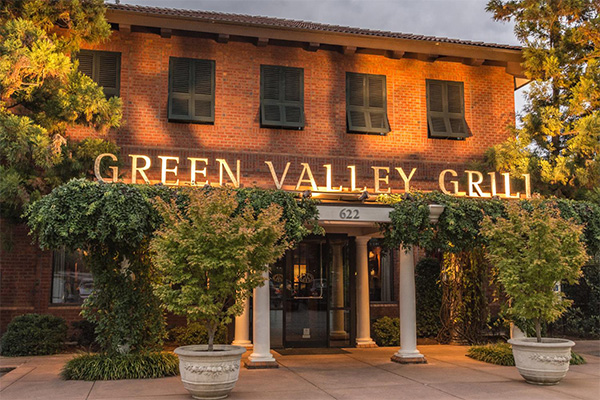
To be sure, the trust bought the restaurant and hotel operating company, not the real estate. The couple, Weaver and three other partners own both hotel properties and lease them to the operating company. They are valued at more than $32 million, county records show. Separately, Quaintance and Weaver own the real estate for Green Valley Grill, Print Works Bistro and the Lucky 32 locations.
Like other employees, the Quaintances are entitled to ESOP retirement units, akin to shares in a company. But annual awards of retirement units are capped for highly compensated managers because federal laws — enforced by the Department of Labor and Internal Revenue Service — prohibit the use of ESOPs as tax-avoidance schemes. Plans are intended to favor younger employees who stay with the company for many years.
Quaintance started working in the hospitality business at 15 as a housekeeper’s assistant at a Missoula, Mont., hotel. After high school, he worked at several hotels in the Northwest before moving to Greensboro in 1979. Sipping a sparkling water on the patio of the Proximity Hotel, a cool space shaded by magnolias and tucked between the tall darkened windows and white brick of the hotel and Print Works Bistro, he asks a server to turn up the volume of a Roberta Flack song streaming over the sound system. Walking past a shrub, he plucks a stray dead leaf and tosses it out of sight.
Quaintance’s meticulous style stretches back to his early days in the industry. Just weeks after partnering with Bill Sherrill to open Franklin’s Off Friendly 38 years ago, he spotted a college-age waiter goofing off while emptying ash trays. Quaintance grabbed the waiter — this writer — by the necktie and told him loafing on the job was unacceptable. I worked there in the summer of 1979 and the following Christmas break. Mary Lacklen, also a former server at Franklin’s, is now director of Red Oak Brewery’s beer hall in eastern Guilford County, opening later this year. “He always believed in training his staff and setting them up for success,’’ says Lacklen. “He has a methodical approach to everything he does.’’
During his stint at Franklin’s, Quaintance met Weaver, a regular customer, and his future wife, Nancy King, who worked at the restaurant while on Christmas break from Cornell University. After leaving the restaurant in 1981, Quaintance had stints in business planning, wine importing and managing chain restaurants. Nancy worked for Marriott Corp. in Charlotte.
On a trip to Europe in the mid-’80s they decided it was time to plan their future. Riding a train on the Brenner Pass between Italy and Austria, they settled on three possible choices: “Mr. and Mrs. Hotel and Restaurant” in Greensboro; “barefoot and pregnant” in New Mexico, where Nancy would teach and Dennis would buy, fix and resell airplanes; or move to Europe, with Nancy working for Marriott in London or Amsterdam.
Both wrote “Greensboro” on slips of paper. “It sounded so typical,” Quaintance recalls, “but why should we sacrifice what’s exciting to us?”
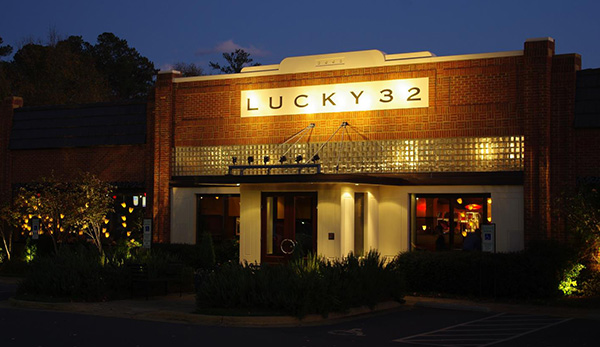
Lucky 32 was Quaintance-Weaver’s entry into restaurants in 1989.
Returning to North Carolina, Quaintance joined the Greensboro-based Tripps chain of casual, restaurants. By 28, he was overseeing five sites. He then circled back to Weaver, asking for a $500,000 loan to start his own restaurant. Instead, Weaver proposed a 50-50 partnership, with Quaintance running their first restaurant venture, the Lucky 32 on Westover Terrace in Greensboro. It debuted in 1989.
Almost a decade later, they opened the O.Henry Hotel, named and designed after the first modern Greensboro hotel that was built in 1919 and razed 80 years later. Both were named for native son William Sydney Porter, who in the early 1900s wrote short stories with surprise endings under the pen name O. Henry.
The Proximity Hotel, which opened in 2007, is named after one of Greensboro’s first textile mills. One hundred rooftop solar panels give a nod to a modern-day achievement: It was the nation’s first hotel to receive the highest environmentally friendly honors from the U.S. Green Building Council. To retain its uniqueness, Quaintance has never signed a franchise agreement with a major hotel company. The goal is to provide a memorable stay for travelers while also entertaining neighborhood folks, much like the old hotels that were centers of community life.
On a recent afternoon in June, Quaintance wore khaki shorts, a blue-and-white-striped shirt and sandals. The look is in keeping with his hotels, which are high-brow but comfortable with unexpected touches reflecting the CEO’s personality.
Two bikes propped inside the entrance to the Proximity Hotel are available for guests. An afternoon tea at the O.Henry attracts locals, while refurbished London taxis provide transportation for hotel guests, including complimentary rides to the company’s three restaurants. In Quaintance’s view, the ESOP is like one of those taxis: He figures to keep driving for at least a decade, unless “I notice I’m slipping, or people tell me I’m slipping, or if I lose my mojo,’’ he says. Shared ownership is a fuel additive, boosting morale and productivity that will result in more satisfied patrons.
Selling Quaintance-Weaver to employees addresses one of the biggest headaches for the hospitality industry, which has a high turnover rate: “How do you get people to stay?’’ Greensboro restaurant critic John Batchelor says. “You make it in their interest to stay by making them partners in the enterprise.’’
Given wage rates in hospitality, motivating workers is a constant challenge. Half of Quaintance-Weaver workers leave within a year, typical for the industry. Another four in 10 leave in the first four years. “If their hearts aren’t into it, we’d rather they go off and find their bliss,’’ Quaintance says. “If our dream is a 10, we’re at a six,’’ he said. “We’re still unfolding.’’
The ESOP also helps Quaintance move toward his goal of creating a meritocracy. “We don’t [care] about what your gender is, whether you are skinny or chubby, if you are black or white, gay or straight, Muslim or Christian,’’ he says. “What we care about is how you behave when you’re here. We are professionals. We don’t need to be friends. We want to be colleagues. We wind up with these amazingly rich relationships without the complications.’’
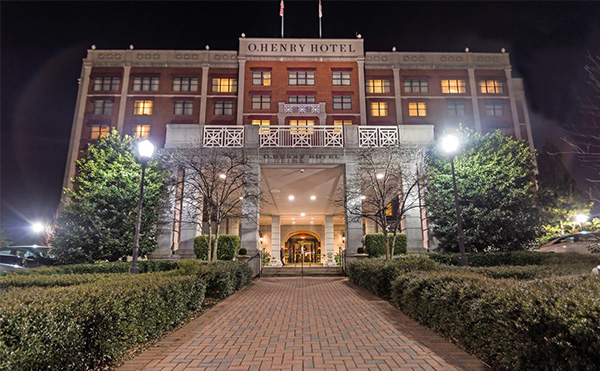
The company has expanded with two hotels in Greensboro’s Friendly Shopping Center area, including the O.Henry, which opened in 1998.
Since announcing the ESOP, Quaintance has coached CEOs of seven companies on the process. “I’m sold on ESOPs,’’ Quaintance says. “I’m big on doing whatever I can to further the notion and reality of economic justice. Don’t hear me being pious. I just think the wealth gap and its growth is not sustainable, and since we don’t seem to have a better idea than free-market democracy, we might as well do all we can to make it work.’’
How much employees will receive in retirement payouts is hard to estimate because so many variables exist, Quaintance says. He offers two scenarios: A 26-year-old employee works for the company from 2016 until retirement at age 65. If her current pay of $25,000 increases by 2.5% a year, she receives about 2.5% of her annual pay in retirement units and the value of the units increases by 2.5% yearly, her account would total about $70,000 at 65. But if the percentages double to 5%, her retirement fund might swell to around $325,000, aided by the power of compound interest.
While employees do not invest their own money into the ESOP, Quaintance-Weaver also offers a 401(k) plan that enables more retirement savings.
“We have no idea what the value of those retirement units will be in the future,’’ Quaintance says. “They could be really low; they could be significant. It all depends on how well we take care of our guests and colleagues and if we are lucky enough to have at least somewhat favorable market conditions.”
Edgar Lujan, a server at Print Works Bistro, is betting on his company’s success. The ESOP is “like a cherry on top of the cake,’’ he says. “We work at a place that enables us to pay our bills, buy a house and take care of our families. It’s hard for me to think about working for another hotel or restaurant.’’
In the 22 years since he moved to the U.S. from Mexico City, Lujan, 45, has worked in restaurants and construction, sometimes two jobs at a time. Moving to Greensboro 20 years ago, he worked initially as a dishwasher at Red Lobster.
He joined the O.Henry Hotel as a porter when it opened, then became a waiter at the adjacent Green Valley Grill. He shifted to the waitstaff of Print Works Bistro in 2007. “There is stability — that is what I love about this place,’’ Lujan says. “If you perform well, you will be successful. Having retirement, that’s awesome.’’
FOOD FOR THOUGHT
Quaintance-Weaver joins other ESOP-owned companies active in North Carolina, including Valdese-based Valdese Weavers LLC, San Francisco-based design firm Gensler; Milwaukee, Wis.-based money manager Robert W. Baird & Co.; and Omaha, Neb.-based engineering and architecture firm HDR Inc. As of 2014, 126 ESOPs were based in North Carolina, according to the Oakland, Calif.-based National Center for Employee Ownership.
The largest U.S. ESOP, Lakeland, Fla.-based Publix Super Markets Inc., entered the state in 2014 and now operates 27 stores that collectively employ more than 3,000 people. More than 80% of company shares are owned by staff, with the balance held by the founder’s family. Shares equal to about 8% of annual pay is distributed to those who have worked for the company for at least one year. Many long-term employees accrue hundreds of thousands of dollars of Publix stock over their careers, perhaps explaining why turnover is a fraction of the retail industry’s average, Fortune noted in a 2016 story. With about 1,150 stores from Florida to Virginia, the company had profit of $2 billion on revenue of $34 billion last year.
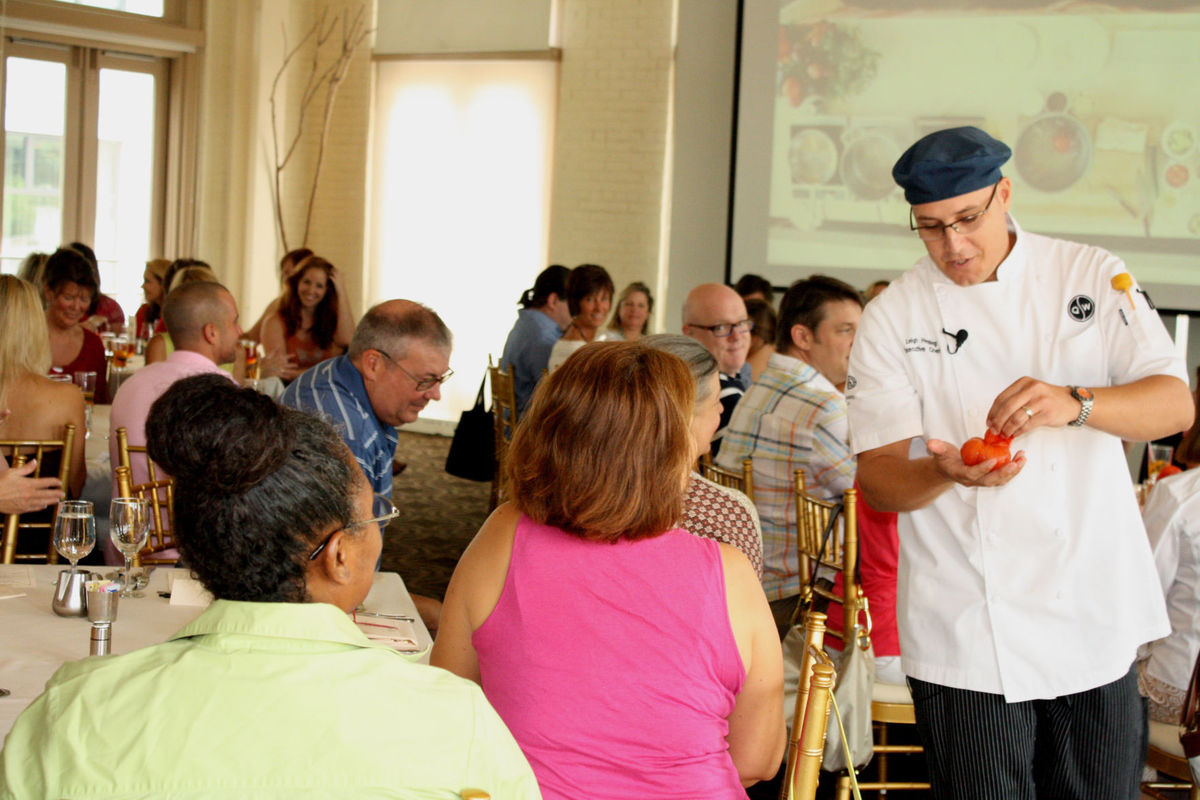
THE DISH
Print Works/Green Valley Grill’s Cooking Class series is and isn’t about the cooking. Sure, Executive Chef Leigh Hesling shows you step-by-step how you’re dish is prepared, aided by large video screens and mirrors. This sit-down food-and-wine pairing is all about experiencing the textures, aromas, taste, culinary ambiance and fellowship with your table mates.
THE CURRICULUM
This three-course meal varies depending on date and season — and what’s in season. The wines paired with the courses are particularly well-thought out.
THE GUY
Chef Hesling claims Australian roots, his Aussie accent unmistakable. He’s part Julia Child, part Tasmanian devil and equal parts Barnum & Bailey. He and his assistants fly around the room, dropping ingredients tableside or showing the dish in-process.
RECIPE?
Yep, you get ’em. Each step of the prep work, sauce, or entrée is outlined on a set of cards so you can follow along. Even if you never try to replicate the dish, you’ll learn cool tips and tricks of the trade.
THE COCKTAIL
This kick-starter is a special concoction from the resident mixologist — and explains why I’m spending more and more time in the bitters section at my favorite food store.
THE WINE
Well-chosen from the U.S., Spain, France, Portugal, Germany and Australia. Chef Hesling explains why they work alongside his dish.
THE LANGUAGE
Perhaps the most entertaining piece of a two-hour afternoon. Avocado should not be subjected to “smoosh-tification.” Raw tuna should be “dice-tificated” provided things don’t get out of hand during the “mix-tifaction” part of the dish, which might include some “soak-tification of the beans” and “jam-ifacation of the plums.”
Hesling reminds: “Of course, I’m in charge of the Queen’s English.”
Other phrases you might hear: “Because I can.” “Because it’s so awesome.” “Because it’s so sexy.” “Now that’s a life-changer.”
WHY YOU SHOULD GO
Most fun you can have with your clothes on. The 2018 series makes a special holiday gift.
2018 SERIES
Proximity Hotel (704 Green Valley Road): 12:30 p.m. Feb. 17, 12:30 p.m. June 9, 12:30 p.m. Sept. 22
O.Henry Hotel (624 Green Valley Road): 12:30 and 6:30 p.m. March 24,12:30 p.m. July 28, 12:30 p.m. Oct. 27
Tickets: $85 per class or three for $235. Order at www.printworksbistro.com/cooking-class/ or contact Lee Healy at 336-478-9126 or lhealy@qwrh.com. Reservations required.
Ed Williams, director of public information at Alamance Community College, likes to pass along helpful tips from this class to culinary students at his college.
By: John Brasier, Triad Business Journal
May 10, 2017
Where does CEO Dennis Quaintance get all the custom furnishings in his company’s O.Henry and Proximity hotels or his Lucky 32 Southern Kitchen, Green Valley Grill or Print Works Bistro dining establishments?
Not from a wholesaler or vendor. From chairs, tables, cabinets and mirrors to lampshades, coat hooks and painting screws, Greensboro-based Quaintance-Weaver’s in-house craft guild designs and produces the unique furnishings and specialty items that help set the luxury hotels and upscale restaurants apart.
But here’s the kicker: Not only are the furnishings custom-made; often, they’re significantly less expensive to make than they would be to buy from someone else.
As an example, Quaintance pointed to refinished countertops at Proximity done by the craft guild that would have cost “three times more” if done outside the company.
“Bottom line, we’re finding we can build things that are unique and more durable,” Quaintance said. “The overall mission of the craft guild is to supply superior products at less cost. Most hotel owners just buy.”
Founded after Promixity opened late in 2007, the guild produces most of the furnishings and decorative items for the company’s hotels and restaurants out of a workshop on East Lindsay Street.
Led by general manager Jeff Kennedy, the guild includes a handful of full-time QW staffers, including “artist-in-residence” Chip Holton, with various skills and a collection of “adjuncts.”
Holton’s charcoal-on-canvas sketches — they will soon be colored — adorn the walls in each room at Proximity.
Quaintance said he believes the well-traveled executives who frequent his Greensboro hotels notice the unique designs and detailed craftsmanship.
Quaintance estimates the guild has done 100 projects at Proximity, the first facility in the hospitality industry to receive LEED Platinum status from the U.S. Green Building Council for its energy efficiency and high performance.
“Many of our guests stay in hotels 100 days a year,” he said. “We think when something is made by people who are sort of soulfully with it — not like a production-line thing — and built especially for the space its going in, people notice.”
“They come back and they like to see the changes,” Kennedy said.
Guild members produce items conceived at design meetings held most Tuesday afternoons at different sites.
In recent weeks, Proximity has received the most attention. Those projects at the industrial-chic hotel include “antiqued” mirrors and several dozen side tables with gold leaf frames and enameled concrete tops.
Guild projects also fill the O.Henry as well as QW restaurants. Lobbies, guest rooms, dining rooms and outdoor terraces are filled with utilitarian and decorative items created or refurbished by the guild to fit into nooks and crannies and complement the design. Finding those perfect items were often a problem prior to the formation of the craft guild.
During the recession that began in 2007, Quaintance said he moved Kennedy, hired as an engineer at O.Henry, to a position working for all of QW’s businesses.
Kennedy gradually assembled a versatile staff, capable of doing not only general maintenance duties, but creating top-quality products.
“I asked Jeff, ‘Why can’t we start building things instead of buying them?’” Quaintance recalled.
Majedeh Modarres Nezhad is the design team project manager. Quaintance, who admits design is one of his passions, attends most of the meetings but said everyone’s opinions are considered equally.
“Most of the people who really enjoy being part of the team don’t get sweaty palms when I’m around,” Quaintance said. “Most of us are responding to the boss of ideas. We’re always working on something. Our first focus is reversing negatives. Second is creating positives.”
Prior to forming the craft guild, Quaintance said he and the late Don Reeves, his former designer, came up with ideas, then hired vendors to carry them out.
How much has QW saved by forming the craft guild? Quaintance said he doesn’t know.
“I probably should have kept track of that,” he said. “We’ve saved money. More important, we have unique features. We have always endeavored to have items that are unique. Whenever we reach a dead end with an item we need, we give it to the craft guild.”
John Brasier covers development, commercial and residential real estate, construction and retail.
By Ogi Overman
Go Triad, February 5, 2015
 Timing is everything in Dennis Quaintance’s world.
Timing is everything in Dennis Quaintance’s world.
When he moved to Greensboro in 1979 to help old friend Bill Sherill open Franklin’s Off Friendly, the timing was right. Nine years later, when he teamed up with developer Mike Weaver and opened Lucky 32 Southern Kitchen, the timing was right. And each subsequent project — the O. Henry Hotel and its Green Valley Grill, the Proximity Hotel and its Print Works Bistro, and a second Lucky 32 in Cary — was done only when the timing was right.
And lately, he has embarked on another project-within-a-project that he had envisioned at least 20 years ago but didn’t pull the trigger on because “the timing wasn’t right.”
As of January 15, the timing was right. Starting that night, “Thursday Night Cocktails and Jazz with Neill Clegg and Dave Fox” came to life, transforming the O. Henry’s lobby into a jazz venue.
Two of the Triad’s most revered musicians, Clegg who plays saxophone, clarinet and flute, and Fox, who plays piano, are music professors at Greensboro College and frequent collaborators. They will be the mainstays of the jazz night, but they will also bring in a featured vocalist each week.
“These are the cream-of-the-crop jazz vocalists in the area,” Clegg said. “We have a roster of a half-dozen or so who will rotate, but we will also bring in some others from time to time. Trust me, each night will be special.”
Indeed, the roster is a who’s who of top-shelf vocalists: Joey Barnes, who kicked off the series; Nishah DiMeo; Jessica Mashburn; Martha Bassett, who will perform tonight; Chris Murrell; Sarah Strable and Clint Horton.
But the music, although the main attraction, is only the beginning of the transformation. The room itself is the co-star, helping create the ambience that Quaintance had envisioned even before he built the hotel. When designing the O. Henry’s lobby, he purposely patterned it after the fabled Oak Room of the Algonquin Hotel on West 44th Street in New York, home of the Algonquin Round Table, the literary and theatrical giants of the 1920s, and later a 32-year-long flourishing jazz scene.
The Oak Room closed in 2012.
“I used to read about it and have been in the lobby of the Algonquin at least 10 times, and that’s always been the environment we wanted to create with the lobby of the O. Henry,” he said. “I know they haven’t done jazz there for years, but that’s always been the ambience we were going for.
“My designer, the late Don Reeves, and I talked about it endlessly, about how you want people to feel, what kind of energy that room has. We talked specifically about this being an environment that would be adaptable for an afternoon tearoom but still be appropriate for a jazz piano vibe in a sophisticated sort of way. We knew exactly what we wanted but waited to do this jazz thing because it just never felt right.”
In other words, timing.
So, what is it about now that made the timing right? In short, it was his music sommelier and performance artist in residence, Jessica Mashburn. In addition to her own thriving career as a singer-pianist, she programs the music for all his restaurants and hotels and, with life and musical partner, Evan Olson, performs as AM rOdeO at Print Works Bistro every Wednesday night.
She and Quaintance had been brainstorming for years about launching jazz in the lobby, but the idea only took flight when Mashburn and Olson were asked to take part in a compilation CD called the “Healing Blues Project.”
And who did the asking? Neill Clegg and Dave Fox.
The “Healing Blues” endeavor was a fundraiser for the Interactive Resource Center, initiated by their colleague at Greensboro College, art professor Ted Efremoff, wherein local songwriters were teamed up with homeless people, and they penned and recorded tunes about what got them to this point in their lives. All the proceeds from CD sales and four live concerts went to the IRC.
“We were so honored to be asked to be included in this project,” Mashburn said.
“Obviously, I knew Neill and Dave by reputation but had never gotten to know them personally until getting to work with them on this. Suddenly, I realized that they would be perfect for Dennis’s idea. They’re classy, dependable and well-respected and can play pretty much the whole American Songbook.”
So, in early October, Mashburn arranged a meeting between Quaintance and Clegg. To say the two clicked would be an understatement.
Clegg, the saxophonist, remembers it thusly: “He said a hotel lobby is a civic green space inside, where people can gather and be themselves, even though they may be strangers; there’s no place like it. I’d never heard it expressed that way.
“He said he wanted impeccable service and fussy drinks and specialty dishes and a room filled with aromas and enhanced by the sound and the look,” Clegg said. “And he was obviously very knowledgeable about the kind of music he wanted. His vision was rather extraordinary.”
Quaintance smiled at his recollection of the meeting.
“I knew he was the man who could make this happen immediately,” Quaintance said.
“I felt like I was the guy who had the keys to the playground he had been walking by and lusting to get in, to get on that merry-go-round. And I said, ‘You want to come in here?’ and he said, ‘You mean it?’ I knew that the stars had aligned.”
Timing.
The jazz project would need some marketing expertise, so Clegg’s wife, Victoria, was brought aboard to lead that effort.
“I think we’re about to make some beautiful cultural history in Greensboro,” said Victoria Clegg, a felt artist, decorator and horticulturist.
“On any given Thursday evening, you will step into O. Henry’s grand social lobby and find a diverse mix of the Triad’s cultural and artistic set.
“A delightful evening out where crafted cocktails are savored, ideas are shared, insights arrived at and the designs that result will continue to help shape the cultural fabric of this city. This will certainly satisfy my fascination of music and theater, and I can still be home in time to get my beauty sleep.”
Naturally, the musical fare will vary from week to week, but Neill Clegg said it will “mirror the elegance of the room.”
He added, “We have a huge repertoire to choose from. You’ll hear swing, traditional and cool jazz, bebop, everything from Louis Armstrong to Charlie Parker to Miles Davis, all the way through the first wave of Brazilian jazz.”
Mashburn, who performed there last week and will perform again on Feb. 26, said, “It’s a musical history that has been bound to happen in the O. Henry lobby for over a decade. Dreams take time to materialize. I’m just grateful that the melody of this great weekly event has finally been composed and is ready to be heard and enjoyed by our community.”
Quaintance said the festivities begin each week at 5:30 pm and run to 8:30 pm. There is no cover charge.
“I want people a hundred years from now to know that this is where jazz was played and enjoyed in Greensboro,” said the personable restaurateur-hotelier, grinning. “Our whole dream (with wife, Nancy, and business partner Weaver) has been to do things that people experience with delight, things that make their lives more full and rich. If we can make people enjoy living here more than they already do, and we get to make a living doing that, how cool is that?”
As cool as a Gershwin tune set to a Cole Porter lyric.
May/June 2015
By: Kellie Grammer
Photography by: John O’Hagan
Step into the lobby of the O.Henry Hotel, and you’ll find a modern establishment teeming with Old-World charm. Wood paneling, tall ceilings, and beautiful furnishings welcome guests and set the scene for a serene getaway or a regal afternoon-tea service, both honed to perfection.
The hotel opened its doors in 1998, but its roots date back to the early 20th century. The original O.Henry in downtown Greensboro was named for the alias of one of Greensboro’s famed natives, William Sydney Porter. That structure was built in 1919 and then was demolished in the 1970s, leaving a void in the area. In the interest of preserving the beauty and culture of a community-centered hotel, a new O.Henry Hotel opened. Family owned and operated, it focuses on hospitality, comfort, and style in every aspect of its rooms and amenitie
The O.Henry has been serving tea since 1998, but the service has recently been revitalized through the talents of Executive Pastry Chef Laura Dominguez, who trained at the French Culinary Institute in New York City.
Tea-loving locals and hotel guests alike take tea daily in the O.Henry’s social lobby — a lovely marriage of class and comfort, inviting guests to enjoy a special time with friends and family. Plush chairs and couches are gathered around low tables that are well suited for conversation over tea.
Guests may choose from a variety of afternoon-tea options. Three-tiered trays offer scones paired with curd and cream, and array of savory dishes, and a selection of sweets, all of which vary seasonally and utilize local ingredients wherever possible. The flavors of the savory madeleines and muffins change every four to six weeks as the menu shifts at Green Valley Grill, the hotel’s restaurant.
“The O.Henry has the kind of Old-World charm that you just don’t expect to find in a place like Greensboro,” Chef Dominguez says. “Everything is really comfortable and elegant, and it feels like something you’ve never experienced before.”

